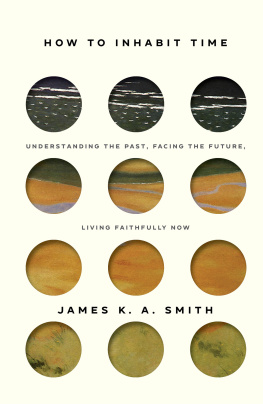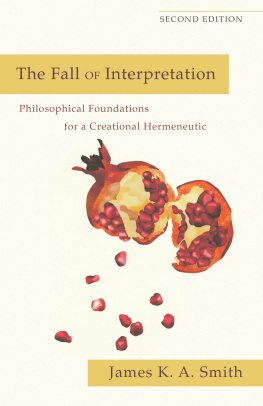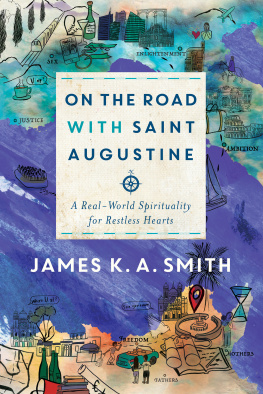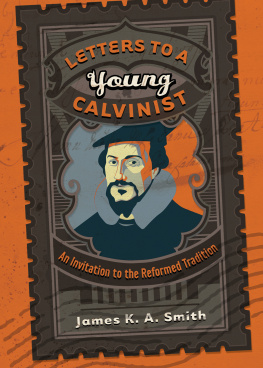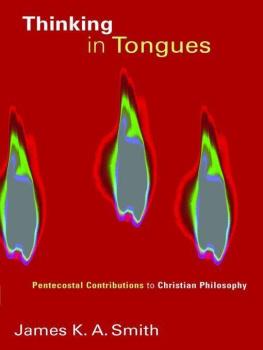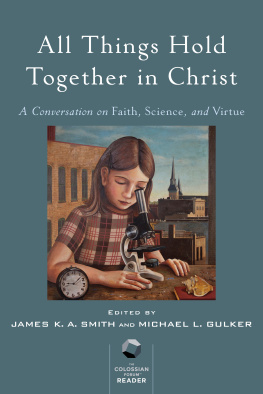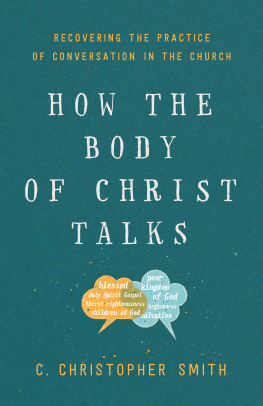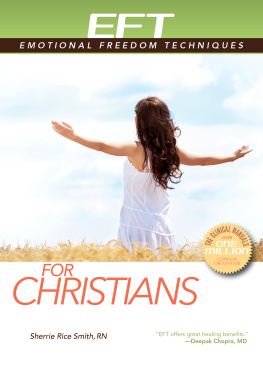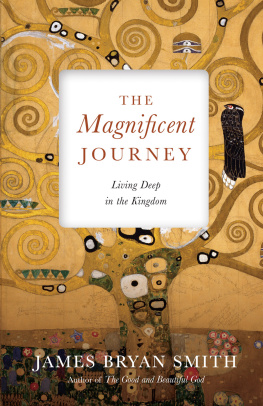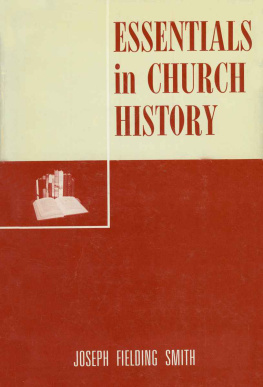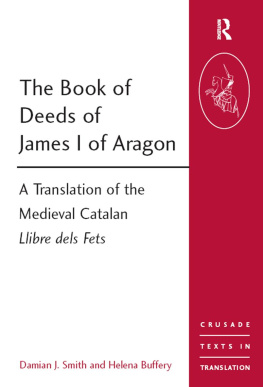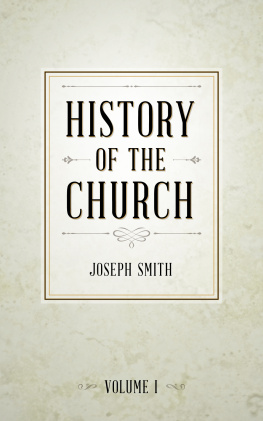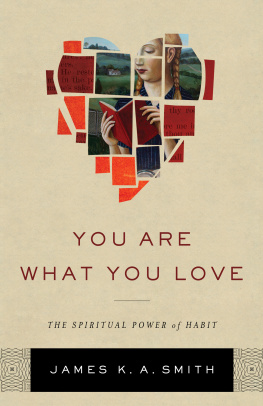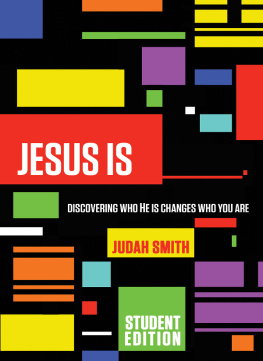Endorsements
Annie Dillard memorably wrote, How we spend our days is, of course, how we spend our lives. There is only the particular. And the Christian faith gives us a distinct place to stand in the present, formed by a specific history and drawn by the eschatological Spirit into Gods future. Yet, as James Smith shows, often proponents of the very faith, which should locate us most clearly in Gods time, settle for the parodynowhen Christians. This book has helped megenuinely. James Smith has helped me think about the subject of time in a fresh way. I greatly enjoyed the distilled wisdom, the broad philosophical engagement, the connecting of Scripture, tradition, and culture. Truly this book is a gift which has engaged my awareness of how we are called to live the gifts which are our lives. My hope and prayer is that the impact of this book on how we liveon the times of our liveswill be exponentially more than the time it took to read it.
The Most Rev. Justin Welby , Archbishop of Canterbury
A life is always a life time , and ours is a time of toil, writes James K. A. Smith. But he shows us that time is more than toil. It is a gift waiting to be redeemed, and a central conviction of this book is that the Lord of the star fields is intimately attuned to our haunted, beautiful histories. Dwelling with these lucid, winsome meditations on spiritual timekeeping was like listening in on a lively conversation between St. Augustine, Gustavo Gutirrez, James Baldwin, and Marilynne Robinson, while Pink Floyds Dark Side of the Moon played in the background.
Fred Bahnson , author of Soil and Sacrament
Half Title Page
Title Page
Copyright Page
2022 by James K. A. Smith
Published by Brazos Press
a division of Baker Publishing Group
PO Box 6287, Grand Rapids, MI 49516-6287
www.brazospress.com
Ebook edition created 2022
All rights reserved. No part of this publication may be reproduced, stored in a retrieval system, or transmitted in any form or by any meansfor example, electronic, photocopy, recordingwithout the prior written permission of the publisher. The only exception is brief quotations in printed reviews.
Library of Congress Cataloging-in-Publication Data is on file at the Library of Congress, Washington, DC.
ISBN 978-1-4934-3862-4
Unless otherwise indicated, Scripture quotations are from the New Revised Standard Version of the Bible, copyright 1989 National Council of the Churches of Christ in the United States of America. Used by permission. All rights reserved.
Scripture quotations labeled NIV are from THE HOLY BIBLE, NEW INTERNATIONAL VERSION, NIV Copyright 1973, 1978, 1984, 2011 by Biblica, Inc. Used by permission. All rights reserved worldwide.
We Americans
Words and Music by Scott Avett, Seth Avett and Robert Crawford
Copyright 2019 First Big Snow Publishing, Ramseur Family Fold Music, Nemoivmusic and Truth Comes True Publishing
All Rights Administered by BMG Rights Management (US) LLC
All Rights Reserved Used by Permission
Reprinted by Permission of Hal Leonard LLC
Baker Publishing Group publications use paper produced from sustainable forestry practices and post-consumer waste whenever possible.
Dedication
For
Sue Johnson
in memoriam
You always had time for us;
we had too little with you.
Epigraph
To hope in Christ is at the same time to believe in the adventure of history.
Gustavo Gutirrez, A Theology of Liberation
I am sittin among you to watch; and every once and a while I will come out and tell you what time of night it is.
Sojourner Truth
Christians have no right to be ignorant of history just because they stand in the truth.
Calvin Seerveld, Rainbows for the Fallen World
The absolute is available to everyone in every age. There never was a more holy age than ours, and never a less.
Annie Dillard, For the Time Being
So much of the trouble of this world is caused by memories, for we only remember half.
Apsley Cherry-Garrard, The Worst Journey in the World
All that can save you now is your confrontation with your own history... which is not your past, but your present.
James Baldwin
We ought not to want to live ahead of time with only the saints and righteous.
Augustine, Letter 189
Contents
Endorsements
Half Title Page
Title Page
Copyright Page
Dedication
Epigraph
Preface
Introduction: When Are We? The Spiritual Significance of Timekeeping
Meditation 1: Ecclesiastes 3:915
Creatures of Time: How to Face Our Forgetting
A History of the Human Heart: How to Learn from Ghosts
Meditation 2: Ecclesiastes 7:1014
The Sacred Folds of Kairos: How (Not) to Be Contemporary
Embrace the Ephemeral: How to Love What Youll Lose
Meditation 3: Ecclesiastes 11:712:8
Seasons of the Heart: How to Inhabit Your Now
On Not Living Ahead of Time: How to Sing Maranatha!
Epilogue: History in Heaven
Acknowledgments
Notes
Cover Flaps
Back Cover
Preface
This book is an invitation to the spiritual adventure we call time. If it promises guidance on how to inhabit time, please dont expect formulas or methods or tips for managing your day planner. Instead, the hope of this book is to occasion an awakening, a dawning awareness of what it means to be the sorts of creatures who dwell in the flux of times flow, who swim in the river of history. Knowing when we are can change everything. Knowing whether its dawn or dusk changes how you live the next moment.
The aim of this book is to encourage a sort of recognition that is the fruit of contemplation . We emerge from the hard, quiet work of contemplation with a new recognition of ourselves, our world, and our relation to the God who encounters us in the fullness of time. As the philosopher Charles Taylor puts it, to recognize ones connection with the Spirit in history is to change oneself and the way one acts. Its like living amid the cacophony of the modern world and finally discerning the beat of the Spirit in history and knowing how to dance in time.
But recognition of the Spirits drumbeat requires careful attention, pausing to become attuned to the world in a new way. Such discernment is the fruit of reflection, rumination, contemplation. This book, you might say, is an exercise in such attunement, an invitation to ruminate on questions we perhaps havent asked. The wager is that such reflection, as Taylor says, changes us and thus changes how we live, even if I cant prescribe exactly what it looks like for you to answer the Spirits call on your life.
You can feel this connection between contemplation and action, reflection and transformation, in Rainer Maria Rilkes poem Archaic Torso of Apollo. The poet encounters the truncated beauty of an ancient statue that, even without the glare of eyes, makes him feel seen. Standing mesmerized before the stone that seems alive, the narrator beholds himself anew. The encounter is a recognition that yields the stark conclusion of the poem: You must change your life.
This book hopes for such self-recognition. But this recognition is more like an awareness that dawns than an argument that can be grasped or a formula that can be repeated. A word of encouragement before you enter: dont come so much to learn as to dwell . This book is something other than a package of information between two covers. We will begin to understand our place and calling in the spiritual adventure of history only if we find a way to hit the pause button on our frenetic absorption in the everyday and resist the tyranny of the urgent. Thats precisely why this book is a blend of philosophy and poetry, memoir and theology.

